UK science 'losing ground' to rival nations
- Published

A jewel in the crown: the UK's Diamond Light Source is a world class research facility in Oxfordshire. But could it become a monument to Britain's former glories in science?
The UK will lose its leading position in science and engineering unless cutbacks are reversed, campaigners say.
The warning comes from the Campaign for Science and Engineering (Case) which represents 100 scientific bodies and businesses.
Latest figures show that many countries are increasing their spending on research while the UK is reducing its.
Case has called for political parties to commit to restore investment to match those of comparable nations.
The organisation's director Dr Sarah Main told BBC News that every major political party has said they wish to place science and engineering at the heart of plans for the country's prosperity and future plans for growth.
But she added that Case's aim was to ensure that that politicians were paying more than lip service to the importance of research.
"When a senior politician makes a statement about the UK being a leading scientific nation, we want to be able to make sure all their other policies act to that end," she said.
"If you look at what other countries are doing they are investing heavily. You can look at averages in the EU or across the OECD and see that they are all going upward.
"Unfortunately, the UK's is going downwards from a fairly low point already, so we are 21st on a league table of countries in terms of research spending, behind the Czech Republic, Belgium and Luxembourg - and that is not where you want to be if you want to be a global leader."
Case will write to every political party with at least one MP asking them to reverse this trend. It has asked for manifesto commitments to gradually increase investment so that research spending matches that of comparable countries, such as Germany in 10 years' time.
In briefing documents, external, the campaign group argues that the UK's level of investment is already low by international standards and is declining.
It shows that the UK has invested below the European Union average for many years. The EU average rose from 2.04% of GDP in 2011 to 2.07% of GDP in 2012, while UK investment dropped from 1.78% to 1.72% of GDP.

The graph shows research spending as a percentage of GDP. The UK has fallen behind the European average - a trend that has occurred over successive governments and one that is set to continue
In 2010, the chancellor George Osborne froze science spending and ring-fenced it for the duration of the Parliament. At a time of cutbacks in other areas of government spending, this was seen as a good deal for science and engineering in the Autumn Statement. However, the effect of inflation has meant that there has been an effective cut of £1.1bn over the past five years.
The Chancellor also nearly halved spending of so-called capital spending for building new laboratories and buying equipment amounting to an additional cut of £1.59bn, though he did manage to find £111m for the final phase of the UK's prestigious Diamond Light Source research facility in Oxfordshire.
'Pet projects'
Successful lobbying by the scientific community has persuaded Mr Osborne to restore many of the capital cuts in specific areas such as graphene research and high speed computing on an ad hoc basis. However, the former chair of the Lords Science and Technology Committee, Lord Krebs, has said that that the unpredictable nature of the cash injections by the Chancellor raise concerns that he has been funding "pet projects".
What is preferable, Lord Krebs argues, is for the scientific community to have the financial stability to develop a clear strategy for long term investments, as occurs in other industrialised countries.
Despite the previous Labour government's boost to research spending during its term of office, it too failed to keep pace with investment by other nations as a proportion of GDP.
The Treasury, however, believes that measuring research effort as expenditure as a proportion of GDP is over-simplistic - a view supported by the former Science Minister, David Willetts.
"I would like to see more spent on science and it is something I argued for when in government. But comparing it as a proportion of GDP is a crude measure," he told BBC News.
"The UK is already a high skills nation with advanced technological companies and so may not require as much research and development that conventional industries require."
But some policy analysts, such as Dr Kieron Flanagan of Manchester University, say that it is misleading to make simplistic international comparisons. Many countries spend much more on applied research and technology - a factor that possibly underplays the healthy comparison that can be made when comparing basic, blue skies research in areas such as physics and medical science - which underpin many innovations.

OECD government spending on research as a percentage of GDP. The UK, shown in red, ranks 21st
"Although there has been a general improvement in the extent to which Case's lobbying is informed by the evidence base over recent years, there are still quite a few anecdotes offered as evidence. They clearly feel that they have to make a strong, simple, linear economic argument because they believe, rightly or wrongly, that this is the only thing the Treasury will listen to," he told BBC News.
"But there is a danger in making this kind of case. It ratchets up expectations that can't be met or at least can't be proven and creates demand from Government for further efforts to steer or concentrate fundamental research funding and to maximise 'impact'," he said.
Dr Flanagan believes that more emphasis should be put on building up the UK's applied research and technological development capabilities.
- Published21 November 2013

- Published29 November 2011
- Published3 October 2011
